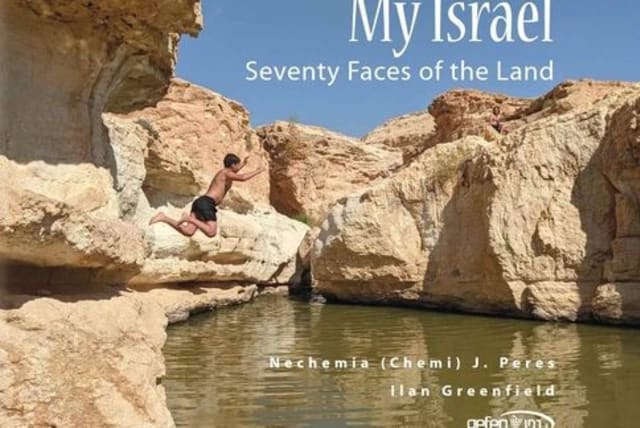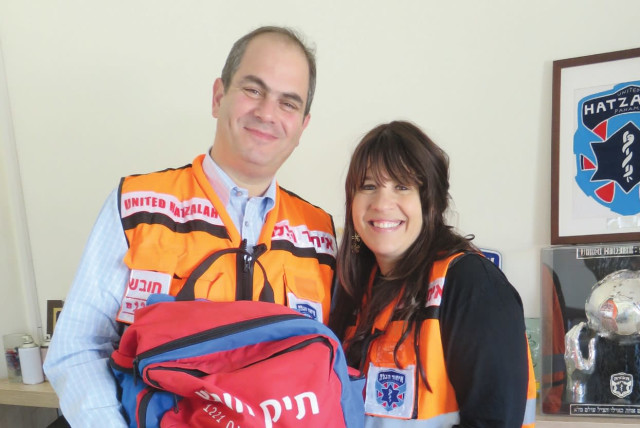'My Israel': A work of love on the different faces of the Jewish state - review

In this book, 70 prominent Israelis put down into moving words what they see in their own special corners of the Land of Israel.
“My Israel is an amazing way to celebrate Israel with a book,” says Gefen Publishing House owner Ilan Greenfield, who compiled the new volume together with his childhood friend Nechemia (Chemi) J. Peres. “My Israel: Seventy Faces of the Land is a work of love. Here, 70 prominent Israelis put down into moving words what they see in their own special corners of the Land of Israel.”
Asked about the title, Greenfield says, “There’s a saying from our sages – ‘Shivim panim la’Torah’ (the Torah has 70 faces) – which expresses the diversity of ways to study it. This book reflects the diversity of the people of Israel – people from a variety of places, backgrounds and achievements.”
Peres, the son of Shimon Peres and board chairman of the Peres Center for Peace and Innovation, says they invited Israelis from all walks of life to share their individual perspectives on what they consider to be “my Israel.”
“We asked each of them to choose one place that represents for them the essence of being Israeli and share with us why they picked that specific location,” he writes. “The result of their work is put forward in this book, showing the magic of a colorful landscape.”
Who else contributed to the book?
Among the contributors are Greenfield’s heroic father, Murray Greenfield, writing about the Atlit Immigrant Detention Center; entrepreneur Ofra Strauss on the music of coexistence in Akko (Acre); Rabbi Mordechai Bar-Or on the Temple Mount’s Foundation Stone; Irina Nevzlin on ANU, the Museum of the Jewish People, for which she serves as board chairman; United Hatzalah founder Eli Beer on Mount Herzl; Kalman Samuels on Jerusalem’s Shalva National Center, which he co-founded with his wife, Malki; journalist Sivan Rahav-Meir on Ben-Gurion Airport; singer David Broza on Masada; judoka Arik Zeevi on the Wingate Institute; and Peres himself on the Peres Center and the Kinneret Cemetery.
“During our work compiling this book, collecting writers and landscapes, on March 16, 2022, my wife Gila and I tragically lost our middle son, Guy, brother to Nadav and Yael,” Peres says, explaining that his son died suddenly of heart failure at the age of 33. “I decided to add another chapter about the beautiful old cemetery on the shores of the Sea of Galilee, dedicated in loving memory to Guy.”
Miriam Peretz, the Israel Prize-winning educator who lost two sons, Uriel and Eliraz, in battle during their service in the IDF, writes poignantly about Nabi Samuel (Samuel’s Tomb), which offers the most beautiful panoramic views of Jerusalem. “Jerusalem is the nexus of the drama and longing of every Jew,” she writes. “According to tradition, Samuel died on 28 Iyar – today celebrated as Jerusalem Day, commemorating the reunification of Jerusalem [which this year fell on May 18]. That is why I decided to locate the memorial for my sons at the foot of Samuel’s Tomb.”
The entry on multidisciplinary diversity at Tel Aviv University by Prof. Ronit Satchi-Fainaro is particularly pertinent to this issue of The Jerusalem Report. “Tel Aviv University (TAU) is a microcosm of all that I love about Israel – socially, academically, technologically, and culturally,” she writes. “It is dynamic, innovative, cosmopolitan, and forward-looking.”
Because of its multidisciplinary and collaborative research culture, she says, TAU researchers and alumni were responsible for some of the top Israeli innovations that changed the world in the last decade, including Waze, Iron Dome, Mobileye, and the first 3-D-printed live heart. “Something to be proud of,” she asserts.
The book, comprising 232 glossy pages of well-crafted entries accompanied by magnificent photographs, is a compendium of Israeli pride of place and can be ordered via info@gefenpublishing.com. “With what’s going on in Israel right now, this should be a book that brings us together for the purpose that the State of Israel was created,” Greenfield concludes.
Jerusalem Post Store
`; document.getElementById("linkPremium").innerHTML = cont; var divWithLink = document.getElementById("premium-link"); if (divWithLink !== null && divWithLink !== 'undefined') { divWithLink.style.border = "solid 1px #cb0f3e"; divWithLink.style.textAlign = "center"; divWithLink.style.marginBottom = "15px"; divWithLink.style.marginTop = "15px"; divWithLink.style.width = "100%"; divWithLink.style.backgroundColor = "#122952"; divWithLink.style.color = "#ffffff"; divWithLink.style.lineHeight = "1.5"; } } (function (v, i) { });

